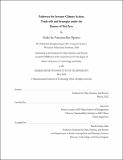Pathways for Investor Climate Action: Trade-offs and Synergies under the Banner of Net Zero
Author(s)
de Vasconcellos Oporto, Pedro
DownloadThesis PDF (2.174Mb)
Advisor
Jay, Jason
Terms of use
Metadata
Show full item recordAbstract
Climate change is a critical issue for financial markets because of physical risk to assets from extreme weather events, and risks and opportunities arising from the world’s transition to a low carbon economy. This transition can be understood as a wave - a metaphor in which investors use different logics in response, resulting in them making the wave, riding the wave, or being hit by the wave. The latter means investors are at risk of shocks from technologies, policies and regulations affecting their portfolio. Riding the wave represents mitigating portfolio risk and tapping into opportunities for improved financial performance, while making the wave is about finding opportunities to drive impact and mitigate systemic climate risk. We dive into how asset managers and asset owners make sense of the transition wave through qualitative means including interviews and case studies. We show how investors are using Net Zero as an overarching goal and explore how they justify their strategies under that banner and what resulting actions are. Using a system dynamics approach we explore interactions from combining certain investor mechanisms for action, such as shareholder engagement, flexible capital provision, and divestment. We interpret these emerging effects as synergies or trade offs between making the wave and riding the wave and chart the course for future research to understand the interactive effects of investor climate actions.
Date issued
2022-05Department
Massachusetts Institute of Technology. Institute for Data, Systems, and SocietyPublisher
Massachusetts Institute of Technology